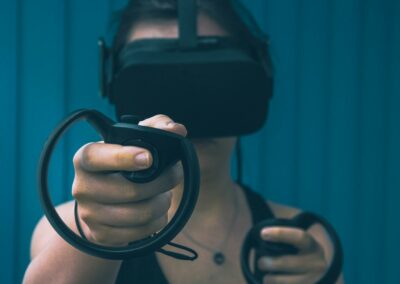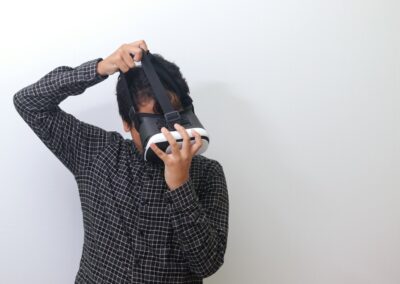Promoting Responsible Use of Virtual Reality in Saudi Arabia and the UAE
Ethical Guidelines: Safeguarding Well-Being in Virtual Reality
As Saudi Arabia and the UAE embrace cutting-edge virtual reality technologies, the potential to transform sectors such as healthcare, education, and entertainment is immense. However, with this transformative power comes the responsibility to ensure that these technologies are used ethically, promoting well-being and avoiding harm. Ethical guidelines are essential in navigating the complex landscape of VR, ensuring that its benefits are maximized while its risks are mitigated.
Virtual reality offers immersive experiences that can significantly impact users’ mental and physical health. In Riyadh, VR is being integrated into healthcare to provide innovative treatments for conditions such as PTSD, anxiety, and chronic pain. These applications demonstrate the potential of VR to enhance well-being. However, without ethical guidelines, there is a risk of misuse, leading to negative health outcomes. For instance, prolonged exposure to VR can cause motion sickness, eye strain, and psychological distress. Ethical guidelines must establish protocols for safe use, including time limits and breaks, to prevent these adverse effects.
Moreover, the immersive nature of VR can blur the lines between reality and simulation, potentially impacting users’ perceptions and behaviors. In Dubai, VR is used for training and simulation in various industries, from aviation to emergency response. While these applications enhance skills and preparedness, they also raise ethical concerns about the psychological impact on users. For example, repeated exposure to high-stress VR simulations could lead to desensitization or increased anxiety in real-world situations. Ethical guidelines should address these concerns by incorporating psychological safety measures and providing support for users who experience negative effects.
Another critical aspect is the protection of user privacy and data security. VR technologies collect vast amounts of personal data, including biometric information and behavioral patterns. In Saudi Arabia, regulatory frameworks are being developed to ensure that this data is handled responsibly, protecting users’ privacy rights. Ethical guidelines must mandate robust data protection measures, ensuring that VR companies implement encryption, secure storage, and transparent data policies. Users should be informed about how their data is collected, used, and protected, fostering trust in VR technologies.
Implementing Ethical VR Practices in Business and Education
The adoption of ethical guidelines for VR technologies is crucial in business and educational settings, where the potential for positive impact is significant. In Saudi Arabia and the UAE, businesses and educational institutions are increasingly utilizing VR to enhance productivity, learning, and engagement. Implementing ethical VR practices ensures that these benefits are realized without compromising well-being.
In the business sector, VR is revolutionizing training, collaboration, and customer engagement. In Riyadh, companies use VR for immersive training programs, allowing employees to develop skills in a safe, controlled environment. However, the intensity and realism of VR training can sometimes lead to emotional or psychological stress. Ethical guidelines should include recommendations for designing VR training programs that prioritize user well-being, such as incorporating debriefing sessions and providing access to mental health resources.
In Dubai, VR is also being used to create virtual workspaces, enabling remote collaboration and communication. While these virtual environments offer flexibility and convenience, they can also blur the boundaries between work and personal life, leading to burnout and decreased productivity. Ethical guidelines should promote work-life balance by setting boundaries for VR workspaces, encouraging regular breaks, and fostering a healthy work environment. These practices help ensure that VR technologies contribute positively to employees’ well-being.
Educational institutions in the UAE are leveraging VR to create immersive learning experiences, from virtual field trips to interactive simulations. These applications enhance student engagement and learning outcomes, but they also present ethical challenges. For example, the accessibility of VR technologies can vary, potentially exacerbating educational inequalities. Ethical guidelines should address these disparities by promoting inclusive access to VR resources and ensuring that all students, regardless of background, can benefit from VR-enhanced education. Additionally, guidelines should provide standards for age-appropriate content, safeguarding students from potentially harmful or inappropriate experiences.
The Role of Leadership in Ethical VR Implementation
Leadership plays a pivotal role in the ethical implementation of VR technologies. Business executives, mid-level managers, and entrepreneurs in Saudi Arabia and the UAE must lead by example, fostering a culture of ethical responsibility within their organizations. This involves setting clear ethical standards, providing training on ethical issues, and ensuring accountability at all levels of VR deployment.
One key strategy for promoting ethical VR implementation is to integrate ethical considerations into decision-making processes. Leaders must evaluate the potential ethical impacts of VR projects and ensure that these considerations are factored into strategic planning and execution. In Riyadh, organizations are adopting ethical review boards and committees to oversee VR initiatives, ensuring compliance with ethical standards and promoting transparency. These bodies provide valuable oversight and guidance, helping to navigate the complex ethical landscape of VR technologies.
Furthermore, fostering open dialogue and collaboration with external stakeholders is essential. In Dubai, VR initiatives involve partnerships with academic institutions, regulatory bodies, and civil society organizations to ensure a diverse range of perspectives inform ethical guidelines. Engaging with the public and promoting transparency in VR projects can build trust and enhance the credibility of VR efforts. This collaborative approach ensures that ethical guidelines are robust, inclusive, and reflective of societal values.
Continuous education and capacity-building are critical for maintaining high ethical standards in VR implementation. Business leaders must invest in ongoing training and development programs that equip their teams with the knowledge and skills needed to implement ethical VR practices. In the UAE, organizations are offering workshops, seminars, and certification programs focused on VR ethics, digital well-being, and responsible innovation. By fostering a culture of continuous learning and improvement, leaders can ensure that their organizations remain at the forefront of ethical VR development.
Conclusion: Navigating the Ethical Landscape of Virtual Reality
The role of ethical guidelines in ensuring that virtual reality technologies promote well-being and avoid harm is paramount. In Saudi Arabia and the UAE, the responsible and ethical development and deployment of VR technologies require a comprehensive approach that balances innovation with ethical responsibility. By addressing concerns related to user safety, privacy, psychological impact, and social equity, business executives, mid-level managers, and entrepreneurs can navigate the ethical challenges of VR technologies effectively.
As VR technologies continue to evolve, the importance of ethical guidelines and responsible practices will only increase. By implementing rigorous assessments, promoting public engagement, fostering a culture of ethical leadership, and investing in continuous education, leaders in Riyadh, Dubai, and beyond can ensure that VR technologies serve as a force for positive societal change. Ultimately, a commitment to ethical integrity and well-being will guide the successful integration of VR technologies into society, benefiting both individuals and communities.
—
#VREthics #VirtualRealityGuidelines #PromotingWellBeingWithVR #AIinSaudiArabia #UAEVRRegulations #RiyadhVirtualTechnology #DubaiVREthics #AIinHealthcare #LeadershipInTechnology #EthicalTechPractices























